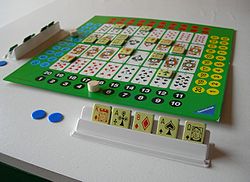Cartino
| Cartino | |
|---|---|
 1974 game with cardboard cards |
|
| Game data | |
| author | Alex Randolph as DF Oudolf |
| publishing company |
Ravensburger , Milton Bradley |
| Publishing year | 1969, 1974, 1976, 1977 |
| Art | Board game |
| Teammates | 2 to 6 or 2 to 4 |
| Duration | 45 minutes |
| Age | from 10 years on |
Cartino , also known as Cardino , is a board game for two to four players that was originally published by Ravensburger in 1969 . The game was developed by Alex Randolph under the pseudonym DF Oudolf . The aim of the game is to place pieces with card symbols in such a way that you get more points than your fellow players. The original 1969 version is based on a 52 rummy sheet , the later, simplified versions published from 1974 to 1977 are based on a 32 sheet. In 1969 and 1974 the game with pieces appeared, in 1976 with cardboard cards and in 1977 with cardboard cards together with the game Lingua in one package. In addition, the game appeared in 1974 in the 13-part Ravensburger casino series with a decorative sleeve. Milton Bradley brought a 32er version as Cardino out.
Game setup
The game board consists of the 32 cards of a skat sheet , which are divided into 4 rows of 8 cards each. The four colors of the game are in two rows of four cards each in the corners, with the 10 on the outside and the ace on the inside. These have different ratings from one to five points. On the edge of the board there is a scoring track with twenty circles for each player. In the course of the game, each card field is filled with two identical pieces, so there are 64 pieces and two jokers.
Each player blindly draws five tokens from the pool of cards and places them on his or her storage bench, invisible to other players.
Rules of the game
The players must successively place one or more pieces on the corresponding card fields, whereby all pieces must have the same card color . Then as many new stones are drawn as have been put down. If a player places all five stones, he receives ten bonus points. However, it is not the points on the fields that count, only those of the neighboring fields that are occupied. Jokers can be placed and later exchanged for a real card.
The game ends when the board is fully occupied or prematurely when there are no more pieces in the pool and one player has been able to put down all the pieces.
Individual evidence
- ↑ DF Oudolf in the game database Luding D.F. Oudolf in the Luding games database
Web links
- The Ravensburger Casino series at alte-spiele.de
- Cartino (1969) in the Luding games database
- Cartino (1974, 1976) at spielarchiv.de
- Cartino in the game database BoardGameGeek (English)